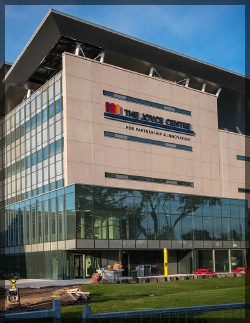Joyce Centre for Partnership and Innovation
In a precedent-setting commitment to experiential learning and environmental leadership, Mohawk College’s Joyce Centre for Partnership and Innovation will be the largest net-zero building in Canada.
Located at the college’s Fennell campus in Hamilton, Ontario, the Joyce Centre’s finishing sign went up on June 12, and will open its doors to its first students in Summer, 2018. The facility will build on Mohawk’s research strengths in health, technology, and energy, with the advanced learning and lab spaces amalgamated and the cutting-edge tools and equipment that Mohawk is known for. Once construction and renovations are complete, enrolment in technology programs will grow from 3,500 to 4,500 students and applied research activity will increase by 50 per cent.
But it’s the building itself that is garnering attention across North America. Built as a net-zero footprint facility (which essentially means it will make as much or more as the energy used in its operation), the Joyce Centre will set the standard for future buildings of its kind. Buildings generate nearly 40 per cent of all greenhouse gases, and the Joyce Centre could be an important step in a significant reduction of greenhouse gases overall.
The Joyce Centre is precedent-setting in other ways, including as the single largest federal infrastructure funding in the college’s fifty years. The Joyce Family Foundation also made history with a $5-million investment in the college.
“Mohawk College is nearest and dearest,” said Steven Joyce, trustee of The Joyce Family Foundation and the son of Ron Joyce. “The programs supporting colleges that really do on-the-job training and work force training ready for employment is key for development of youth across the country. Hopefully we attract talent from not just the Hamilton area but from further away to look at Hamilton as a growing, vibrant city that has something to offer .”
Set the Bar High
“We set the bar high at net zero,” says Tony Cupido, Chief Building and Facilities Officer. “What’s remarkable is the combination of existing technologies we used to achieve our goal. We use solar, geothermal exchange, a heat pump system, but there are few systems that combine this with a variable refrigeration flow process.”
An important cornerstone of the building is the ability to record and monitor the energy usage. The Canadian Green Building Council (CaGBC) has teamed up with Mohawk College and provides third-party verification and data for the public. “We are very proud of the role we can play in advancing the zero-carbon building industry,” says Cupido, adding the Joyce Centre is one of only three education institutions across Canada to be named as a pilot project for the Zero Carbon Building Standard.”
“Mohawk College made its commitment to low carbon clear from the beginning,” says the CaGBC. “The result is a design that clearly demonstrates innovative and forward-thinking design, including these features which made it stand out to CaGBC’s reviewers: A rooftop photovoltaic (PV) system that produces enough carbon-free energy to power the new building, a high-performance building envelope, and a variable refrigerant flow (VRF) geoexchange heat pump system that will provide space heating and cooling.”
Sharing Data
“When you tag a building as net zero it generated a great deal of interest from people,” Cupido says. “We need to be incredibly accurate with the information and data we are generating through the operation of this building and the only way to do that is to submeter the building. We have over 50 submeters to help us understand how efficiently it is operating and how effectively we are managing the building.”
In May 2018, the Joyce Centre became the second project in Canada and the first institutional building to earn a Zero Carbon Building Design Certification through the CaGBC’s cutting-edge Zero Carbon Building Program. The accolades don’t end there: the Joyce Centre has also been awarded the 2018 Engineering Project of the Year by the Ontario Society of Professional Engineers, the 2018 Environmental Sustainability Award by the Alectra Energy Evolution Summit, as well as the 2018 Sustainable
Project of the Year by the Ontario Sustainable Energy Association.
Experiential Learning
The Joyce Centre is more than just the sum of its part. Its great achievement will be as an education tool for students who will be given the opportunity to steer the ship and run the building’s operations as part of their course requirements. The knowledge they generate for Mohawk College, industry partners and the community, will help to create a more sustainable future.
“We want students to understand the building better than I do,” adds Cupido. “If that happens than we’ve really accomplished something here. We are an educational institution; their learning is critical to us as we prepare them for the future.”







